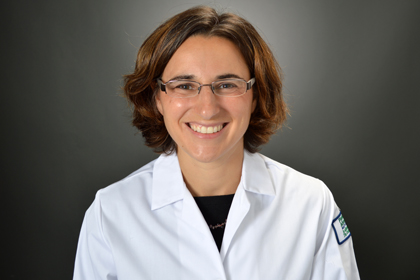Acute respiratory disease (ARD) due to infection with adenovirus is a major cause of morbidity at military training centers. In addition to ARD, adenovirus infection can cause sore throat, pneumonia, conjunctivitis, and urinary infections.

Caroline Lyon, M.D., M.P.H., associate professor of medicine.
Acute respiratory disease (ARD) due to infection with adenovirus is a major cause of morbidity at military training centers. In addition to ARD, adenovirus infection can cause sore throat, pneumonia, conjunctivitis, and urinary infections. Military recruits are particularly susceptible to illness due to their close living quarters, physical stress, and lack of sleep. When the infection is severe, it disrupts training schedules, can lead to hospitalization, and increases medical costs. This spring, the Vaccine Testing Center at the Larner College of Medicine at the University of Vermont (UVM) will test a modernized vaccine to protect troops against adenovirus.
In the 1960s, the Department of the Army developed a vaccine against adenovirus serotypes 4 and 7, the most common causes of illness due to adenovirus. This vaccine was licensed by Wyeth for use in 1980 and as a result, the incidence of ARD in military recruits decreased significantly. When vaccine production ceased in 1996, the incidence of ARD rose. In 2011, Teva Pharmaceuticals obtained licensure and vaccine was again used to prevent adenovirus infection in military recruits. In 2014, the Department of Defense issued a call to modernize the production of this important vaccine. The new formulation is being developed by PaxVax, a biotechnology company based in California. The UVM clinical research team, led by Associate Professor of Medicine, Caroline Lyon, M.D., M.P.H, will evaluate the safety and immunogenicity of this new vaccine.
During this study, subjects who meet specific inclusion criteria will receive either the currently used adenovirus vaccine or the new vaccine. Subjects will be monitored as inpatients at the UVM Clinical Research Center for one week. “Our group has significant experience with both vaccine testing and inpatient studies, and we have successfully worked with PaxVax before, which makes us an ideal candidate to carry out this study,” says Lyon. She and her team previously worked with PaxVax on a now licensed cholera vaccine.
To obtain more information about this study or to volunteer for future studies, please contact the UVM Vaccine Testing Center recruiting office at 802-656-0013 or visit the Vaccine Testing Center website.